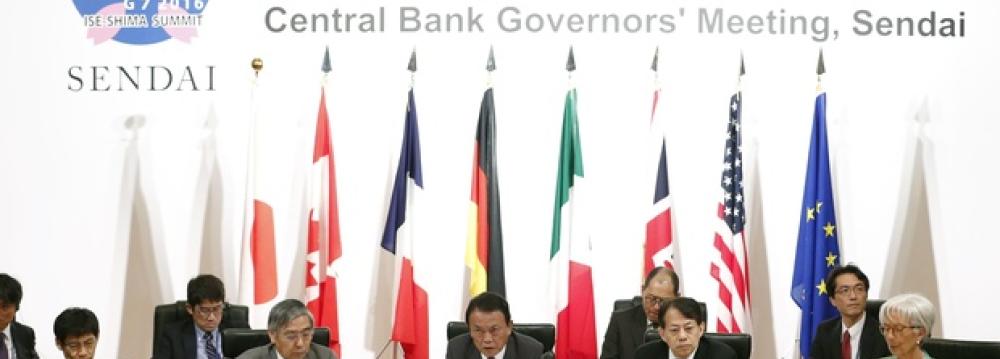Leaders from the Group of Seven advanced economies will examine potential risks to the global economy when they gather this week (Thursday and Friday) for their summit in western Japan, government sources told Reuters.
While the global economy was not at a critical stage, uncertainty was rising and the G7 leaders were expected to promote a combination of monetary, fiscal and structural policies to spur growth in their communique, the sources, who were not authorized to speak to the media, said.
“Uncertainty is rising. We are going to (discuss) downside risks to the global economy,” one of the two sources told Reuters on condition of anonymity.
The G7 groups Britain, Canada, France, Germany, Italy, Japan and the United States.
With Britain and Germany resisting calls for fiscal stimulus, Japanese Prime Minister Shinzo Abe is set to urge the G7 leaders to adopt a flexible fiscal policy, taking into account each country’s own situation, the sources said.
The G7 leaders were also expected to reaffirm their previous commitment to stability in the foreign exchange market, they said.
Apparently shaken by recent cyber attacks against the financial sector, some representatives of G7, reportedly pushed the topic of cyber security to the forefront of conversation at the G7’s meetings in Japan last week, news reports said.
No Silver Bullet
“There are many institutions and many countries who think they can just wait for the perfect technology, a silver bullet to make these issues go away. But they’re not going away,” Deputy Treasury Secretary Sarah Bloom Raskin, who is leading US efforts to create a financial-sector cyber-security framework among the G7, said, according to The Wall Street Journal report.
G7 nations are conducting assessments of their financial sectors’ cyber security infrastructure, and aim to come to agreements about common standards in October.
British Prime Minister David Cameron flies to Japan on Tuesday night, amid speculation he will try to add the Group of Seven to the growing list of endorsements by global bodies and foreign leaders of his efforts to keep Britain in the EU.
On the other hand, Cameron will face opposition from Barack Obama, the US president, and Shinzo Abe, Japan’s prime minister, over Britain’s stance as China’s “best partner in the West” and its refusal to ease austerity at a time of weak global demand.
European diplomats have also criticized Britain’s approach to China.
Following talks in northern Japan last Saturday, finance leaders of the G7 issued an “action plan” calling for increased exchanges of information on financial intelligence, reducing the level of cross-border transactions subject to disclosure and collaborate on targeted sanctions for financial networks of outlawed groups.


